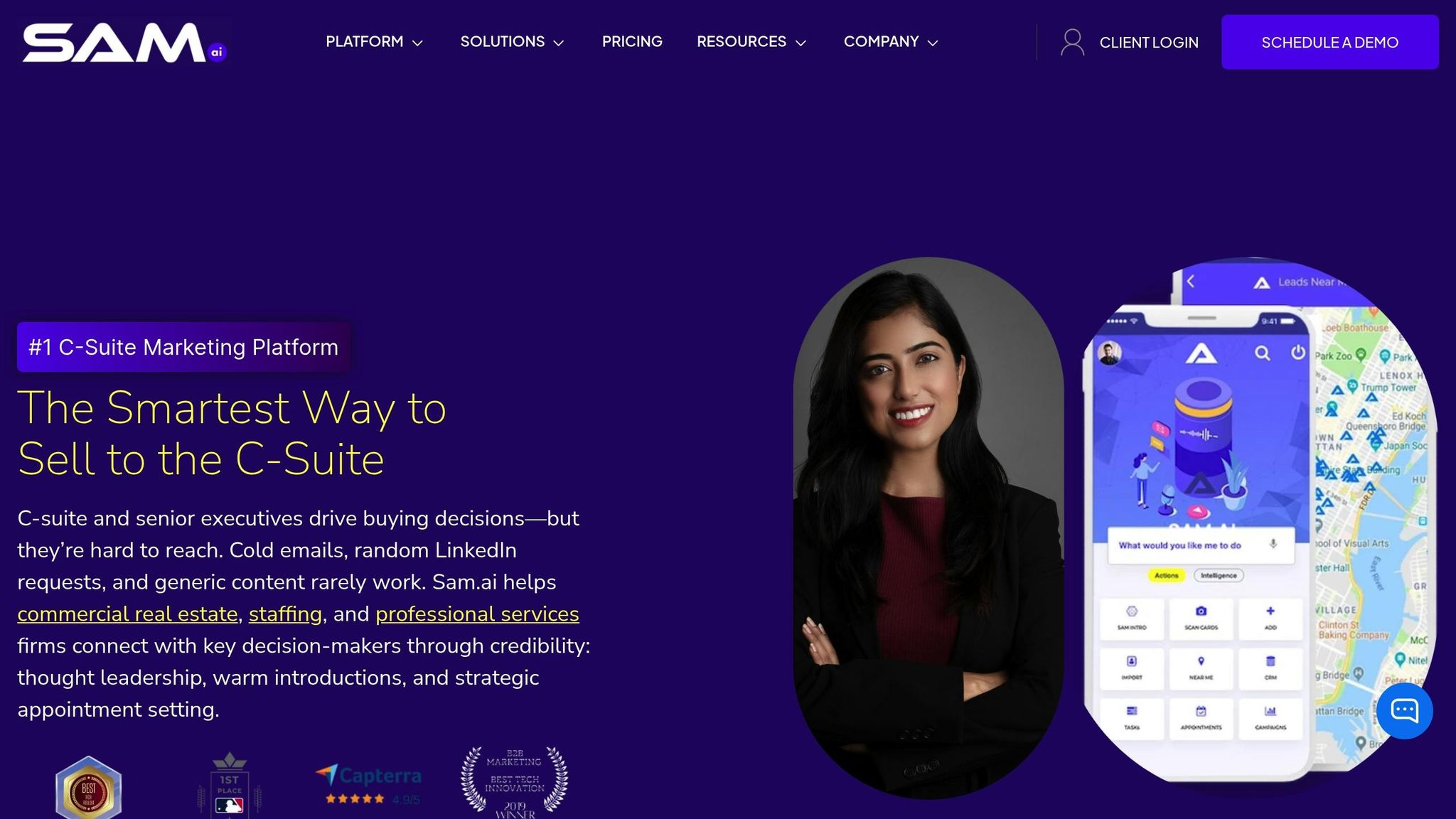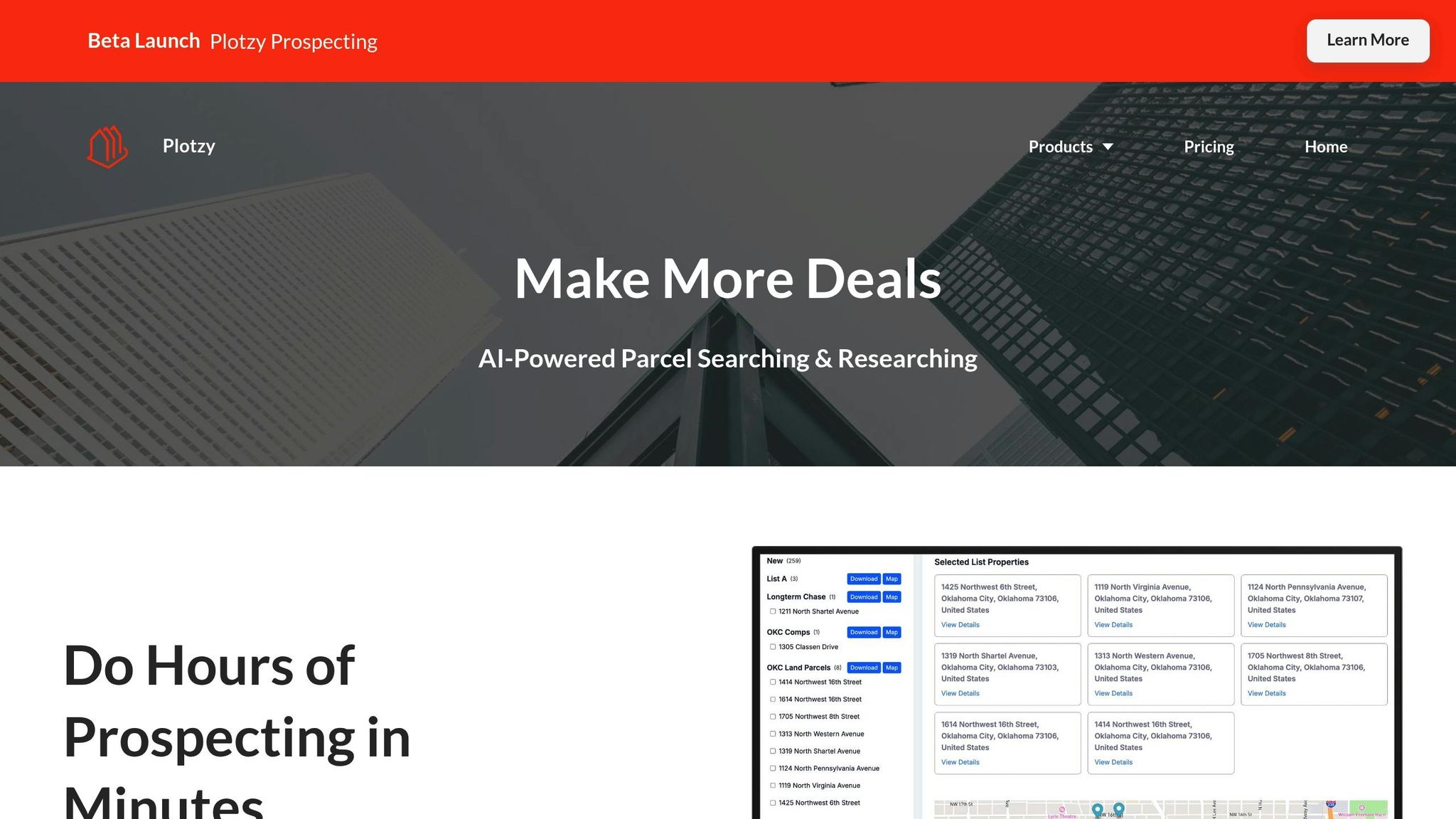A Real Estate CRM is a specialized tool that helps real estate professionals manage properties, clients, and workflows efficiently. Key highlights include:
- Property-Centric Features: Automated follow-ups, contract deadline reminders, and MLS (Multiple Listing Service) integration for syncing property data.
- Commercial Real Estate Benefits: Centralizes client and property data, streamlines workflows, and improves deal tracking.
- AI Integration: AI-powered tools analyze client behavior, score leads, and automate tasks like scheduling and research, saving time and improving decision-making.
- Key Features:
- Centralized data storage for property and client details.
- Lead tracking and deal management with customizable fields.
- Automated communication and follow-ups with integrated calendars.
- AI-driven lead scoring, market analysis, and property research.
AI-driven CRMs are transforming the real estate industry by simplifying complex processes, improving efficiency, and enabling smarter decisions. By 2025, the majority of commercial real estate firms are expected to adopt AI-powered solutions to stay competitive.
Introducing SAM 2.0: A Real Estate System (CRM) The AI-Powered Technology To Improve Your Business

Key Features and Benefits of Real Estate CRM Systems
Real estate CRM systems are game-changers for professionals in the commercial real estate sector, offering tools that simplify and enhance daily operations. These platforms go far beyond basic contact management, tackling the unique challenges of complex real estate transactions.
Centralized Data Storage
A centralized data storage system is the backbone of an effective CRM. Commercial real estate involves handling vast amounts of information - client details, property specs, lease agreements, zoning regulations, and transaction histories. Without a single, secure location to store this data, it often ends up scattered across emails, spreadsheets, or even physical files, making retrieval a nightmare.
With a CRM, all this information is consolidated in one place, providing instant access to client histories and property details. It also ensures version control for critical documents like leases and legal contracts, so your team always works with the most up-to-date information.
This centralized approach is especially useful for transactions involving multiple stakeholders, such as investors, property managers, and legal teams. A CRM tracks all these relationships within a single deal, eliminating the confusion that often arises from managing contacts across various platforms. By unifying data, these systems support smooth lead management and efficient collaboration.
Lead Tracking and Deal Management
Specialized real estate CRMs shine when it comes to tracking leads and managing deals with multiple stakeholders. Unlike residential transactions, commercial deals are more complex, involving longer cycles, higher stakes, and a wider range of decision-makers. Standard CRMs often fall short here, but real estate-specific systems are designed to handle this complexity.
These CRMs allow users to manage multiple stakeholders within a single deal while tracking progress through different transaction stages. For example, a commercial transaction might involve a development team, investors, city planners, and tenant representatives. The system logs every interaction - emails, calls, and meeting notes - against relevant properties and contacts.
Customizable fields make it easy to track property-specific details like square footage, zoning classifications, lease expirations, and cap rates. This tailored approach ensures that no lead is overlooked, even during lengthy negotiation processes, and that every stakeholder receives the attention they need.
Automated Communication and Follow-ups
Automation is another standout feature, making communication and follow-ups more efficient. As portfolios grow, manually keeping track of showings, deadlines, and client outreach becomes overwhelming. This is where automation steps in.
Modern CRMs handle follow-ups, schedule appointments, and assign tasks automatically, ensuring nothing slips through the cracks. Beyond simple email reminders, these systems can flag deals that need attention, reassign stalled tasks, and escalate issues internally to avoid missed opportunities.
Integrated calendars and task workflows sync with tools like Outlook and Google Calendar, keeping critical deadlines, lease expirations, and site visits on track. For instance, when a lease is nearing expiration, the CRM can automatically create tasks for renewal discussions, schedule follow-up meetings, and even generate renewal documents.
AI-Powered Tools and Automation in Commercial Real Estate CRM
AI is transforming commercial real estate CRMs by offering predictive insights and automating intricate workflows. These features are crafted to handle the unique challenges of the industry, where deals often involve multiple parties, lengthy negotiations, and vast amounts of property data.
By 2025, 76% of CRE firms are expected to be piloting, researching, or implementing AI solutions, and 97% plan to fully adopt AI within the next 18 months. These advancements are reshaping how firms approach lead scoring, property research, and process automation.
AI Lead Scoring and Market Analysis
AI-driven lead scoring takes prioritization to the next level. Unlike older systems that rely on fixed criteria, AI employs machine learning to analyze extensive datasets and detect patterns that indicate a lead's likelihood of conversion. It evaluates factors like property preferences, online behavior, location, and budget. For instance, if a prospect frequently views industrial properties in a certain zip code and downloads zoning reports, the system assigns a higher score based on their clear interest and engagement.
The results speak for themselves: 98% of sales teams using AI report better lead prioritization. This allows professionals to concentrate on high-potential prospects rather than wasting time on colder leads. By removing human bias and error, AI ensures a more precise and objective lead evaluation.
AI also strengthens market analysis by processing historical transaction data, current trends, and economic indicators. This helps brokers and investors pinpoint promising properties and markets, enabling smarter investment decisions.
For best results, integrate AI lead scoring into your existing CRM and marketing tools. Use historical data to train models tailored to your company’s sales process and target market.
Automated Property and Owner Research
AI doesn’t stop at scoring leads - it also simplifies property and owner research. Traditionally, this process is time-intensive, but AI automation speeds it up while improving accuracy. By analyzing large datasets, AI can identify patterns and compile detailed property profiles in seconds.
The PropTech sector is projected to exceed $41 billion by 2025, with AI segments growing by over 30% annually. AI-powered research tools can generate comprehensive property profiles that include ownership history, transaction records, zoning details, and comparable sales. They can even uncover off-market opportunities by analyzing property traits, ownership trends, and market data.
When it comes to owner contact details, AI cross-references multiple databases to deliver accurate, up-to-date information, eliminating the need for manual searches through public records. This is particularly beneficial for land acquisition teams and developers who need to connect with property owners quickly.
Firms using AI for research have reported significant gains in efficiency, with client journeys mapped out for smoother experiences.
Workflow Automation for Daily Tasks
AI-powered workflow automation tackles repetitive tasks, saving professionals valuable time. From scheduling and report generation to sending reminders, these systems allow teams to focus on building relationships and closing deals.
For example, AI-driven tools can compile market analyses, property comparisons, and investment summaries into polished presentations. This is invaluable for brokers juggling multiple deals and investors reviewing several opportunities at once.
Document management is another area where AI shines. It organizes contracts, reports, and due diligence files, ensuring everyone works with the most up-to-date versions. This reduces the risk of confusion caused by outdated documents.
To get started with workflow automation, focus on automating the most time-consuming tasks first. Build AI familiarity within your team and choose tools that can scale as your business grows. Track metrics like task completion rates, response times, and deal velocity to ensure the technology delivers measurable improvements. Gradually, you can expand automation to tackle more complex processes as your team becomes more comfortable with these systems.
sbb-itb-11d231f
Solving Common Commercial Real Estate Problems with CRM
CRM systems, equipped with advanced data management and automation features, are becoming essential tools for addressing the unique challenges of commercial real estate. By simplifying manual workflows and organizing vast amounts of information, these systems help professionals reduce overwhelm and uncover new business opportunities.
Managing Large Property Portfolios
Handling extensive property portfolios can feel chaotic without a centralized system. CRM platforms solve this by consolidating critical property details - such as square footage, listing prices, zoning information, ownership history, transaction records, and maintenance schedules - into one easily accessible database.
This centralized approach offers quick sorting and filtering capabilities. For instance, a developer searching for industrial properties over 50,000 square feet in specific zip codes can locate suitable options almost instantly. Additionally, automated reminders for key dates, like lease expirations or property tax deadlines, ensure that no important tasks slip through the cracks.
CRMs don't just stop at portfolio management. They also simplify navigating zoning regulations and maintaining compliance, which is crucial for long-term success.
Working with Zoning Rules and Municipal Information
Staying compliant with zoning laws often involves deciphering complex local regulations that dictate how land can be used. Relying on manual processes to manage these requirements can lead to costly mistakes. CRM systems, enhanced with AI, automate compliance checks and keep track of zoning rules across various jurisdictions, making site selection and regulatory adherence much smoother.
The benefits are clear. A 2024 Deloitte study revealed that 68% of firms using customized software solutions reported better accuracy in regulatory reporting. Moreover, companies leveraging specialized platforms saw a 40% decrease in compliance violations.
"Investment in tailored technology can significantly enhance your compliance efforts." - Deloitte
Some CRMs even integrate with Geographic Information Systems (GIS), allowing professionals to view zoning maps and land use data directly within property records. This feature enables quick assessments of whether a property meets development requirements, ensuring alignment between property details and regulatory needs.
In cities like New York, where zoning compliance can determine a project's feasibility, failing to adhere to these rules can lead to major legal issues. Firms that use their CRM systems to stay informed about compliance requirements report a 30% drop in regulatory infractions compared to those that don't prioritize such training.
Finding Off-Market Properties
Off-market properties often represent untapped opportunities in commercial real estate. AI-powered CRMs streamline the process of identifying these properties by analyzing massive datasets to pinpoint potential opportunities. These systems can also provide accurate valuations, assess risks from factors like climate change, and generate market forecasts .
According to a 2025 industry survey, 87% of brokerages now rely on AI daily, using it for tasks like writing listings and managing client communications. Quick responses are crucial when pursuing off-market deals. Research from Velocify shows that responding to a lead within one minute can increase conversions by 391%. CRM systems make this possible by automating tasks like retrieving owner contact details and crafting personalized outreach messages based on specific property characteristics and market trends.
"AI agents won't replace humans, but instead augment them by handling routine tasks and providing data-driven insights. This will free up human agents' time to focus on nurturing client relationships and managing complex negotiations." - SaM Solutions
The precision of AI-driven property analysis is continually improving. For example, Zillow's Zestimate boasts a median error rate of just ~2% for listed homes. This level of accuracy highlights the value of machine learning in delivering reliable valuations, ultimately supporting better investment decisions and reinforcing the importance of AI-powered CRM tools in the commercial real estate industry.
How Plotzy Improves Commercial Real Estate Workflows

Plotzy's AI-powered platform simplifies everything from property research to closing deals, making it a game-changer for brokers, developers, and investors. By addressing common workflow challenges, Plotzy helps professionals save time and work more efficiently.
"Plotzy is revolutionizing property research for brokers, developers, and land teams. With advanced AI tools, it streamlines parcel searching and information gathering, providing fast and accurate data from public records and county tax assessors." – appvizer.com
By cutting manual research time by up to 80%, Plotzy enables real estate professionals to handle multiple deals with ease.
For Brokers: Managing Leads and Tracking Deals
Plotzy takes lead management to the next level by offering brokers instant access to accurate property data. With AI-driven property searches, brokers can retrieve public records and owner contact details in seconds. Everything can be organized into custom lists based on client type, property category, or location, making it easier to track prospects and properties.
The platform’s Basic plan, priced at $65 per month, includes unlimited property searches and contact retrieval, providing brokers with an affordable way to manage leads efficiently.
For Developers: Zoning Research and Property Analysis
Developers often face delays when researching zoning details, but Plotzy eliminates the wait. The platform delivers real-time zoning information, including permitted uses, height restrictions, and more, allowing developers to make quick decisions. Verification links ensure accuracy, so there’s no need to rely on planning department responses.
Plotzy also helps developers identify parcels that match specific zoning requirements, streamlining the search for suitable properties. The Pro plan, available for $200 per month, includes unlimited property searches, instant zoning answers, parcel filtering with zoning layers, and more - perfect for land acquisition teams.
For Investors: Property Research and Deal Sourcing
Investors benefit from Plotzy’s ability to speed up transaction processing dramatically. While traditional methods take an average of 52 days, Plotzy reduces this to just 10 minutes per property. This efficiency allows investors to seize time-sensitive opportunities and manage larger portfolios effectively.
The platform also offers institutional-grade data, detailed property reports, market analysis, and comparative data to support smarter investment decisions. For those focusing on portfolio management, Plotzy provides tools for property tax reviews, valuation checks, and tax optimization. Flexible pricing, ranging from $29 to $199, ensures there’s an option for every investor’s needs.
The Future of AI-Powered CRM in Commercial Real Estate
The commercial real estate (CRE) industry is undergoing a major shift with the rapid adoption of AI-powered CRM systems. By 2025, the AI in real estate market is expected to grow from $222.65 billion in 2024 to $303.06 billion, reflecting a 36.1% compound annual growth rate (CAGR). Industry leaders are recognizing this momentum - 89% believe that adopting AI is essential to staying competitive by 2025.
AI is no longer a distant concept for real estate professionals. 73% of CRE professionals are early adopters, already using AI to enhance their daily tasks. Meanwhile, 90% of companies plan to integrate AI into their operations within the next five years, supporting human expertise in key areas. Many companies are piloting AI use cases and implementing staff training programs to ensure their teams are prepared for this shift. These efforts are already paying off, delivering measurable efficiency improvements.
For example, automated workflows are saving real estate professionals more than 15 hours per week on administrative tasks. In May 2025, Keyway's KeyDocs tool showcased how AI can transform lease management by automating lease abstraction. This technology scans leases, extracts critical details like rent increases and termination clauses, and provides results within seconds.
"By embracing AI for lease management, real estate teams position themselves to make faster decisions, reduce costs, and achieve smarter growth. The future of lease operations is no longer about paperwork - it's about precision, speed and reliability." - Keyway
AI is also reshaping how CRM systems function in CRE. Platforms now analyze user preferences, budgets, and lifestyle needs to deliver personalized property recommendations. Tools like voice-activated assistants and predictive analytics are becoming indispensable for optimizing investments and minimizing risks.
Looking ahead, the integration of AI into real estate systems is expanding at a rapid pace. AI is evolving beyond standalone tools to create comprehensive property intelligence systems. Future CRM platforms are expected to integrate with rent optimization software, energy management systems, and other property tools, enabling professionals to manage energy usage, monitor security, and communicate with tenants - all from a single platform.
AI is also tackling broader challenges in the industry. It’s helping identify areas suitable for affordable housing development and, when combined with blockchain, is streamlining real estate transactions by enhancing transparency and reducing paperwork. Financial reporting, risk evaluation, compliance, and fraud detection are also becoming more efficient with AI, while portfolio insights help prioritize refinancing, sales, or upgrades. Additionally, automated tools are improving investor relations by generating marketing materials, presentations, and responses to queries.
As the industry moves forward, predictive analytics are becoming the norm. Voice and conversational interfaces are complementing traditional systems, and augmented reality is poised to enhance in-person interactions. At the same time, the focus on ethical AI development is growing as the technology matures.
The global AI tools market in real estate is reflecting this momentum, with projections showing it will reach $41.5 billion by 2033. Investments in real estate tech have already surpassed $100 billion, highlighting AI’s growing role in the field. Even virtual reality in real estate is expected to hit $80 billion by 2025.
For CRE professionals, AI-powered CRM systems are changing the game, revolutionizing property research, client management, and deal execution. The future of real estate is being shaped by smarter, faster, and more connected tools.
FAQs
How does AI in Real Estate CRM help real estate professionals improve lead scoring and make better decisions?
AI-driven Real Estate CRM systems take lead scoring and decision-making to the next level by analyzing essential data points like website interactions, email responses, and property search habits. This helps prioritize leads based on their potential to convert, allowing professionals to concentrate on the most promising prospects.
By leveraging predictive analytics, these tools can anticipate client behavior, giving brokers, developers, and investors the ability to allocate their time and resources more strategically. The result? Smarter decisions, more tailored outreach efforts, and stronger client connections - all while conserving valuable time.
What are the main advantages of using a centralized data storage system in a Real Estate CRM to manage complex transactions?
A centralized data storage system in a Real Estate CRM brings all critical information - like client details, property data, and transaction records - into a single platform. This approach eliminates scattered data, cuts down on duplication, and ensures everyone on the team has access to accurate and current information.
By simplifying workflows, it boosts team collaboration, accelerates decision-making, and reduces mistakes when handling complex transactions. The result? A more efficient process, happier clients, and a smoother experience for professionals in commercial real estate.
How do AI-powered tools in Real Estate CRM systems help find and secure off-market properties?
AI-driven tools in Real Estate CRM systems simplify the process of finding and securing off-market properties through advanced data analysis and automation. By leveraging predictive analytics, these tools can pinpoint potential sellers by examining market trends and historical patterns. This allows real estate professionals to zero in on the most promising opportunities.
These tools also sift through massive amounts of consumer and property data to reveal hidden leads and forecast which prospects might be ready to sell soon. Some systems even go a step further by analyzing visual data - like satellite imagery or street views - to assess properties and spotlight attractive off-market options. By handling these time-consuming tasks, AI tools not only save valuable hours but also help professionals close deals with greater ease and precision.


